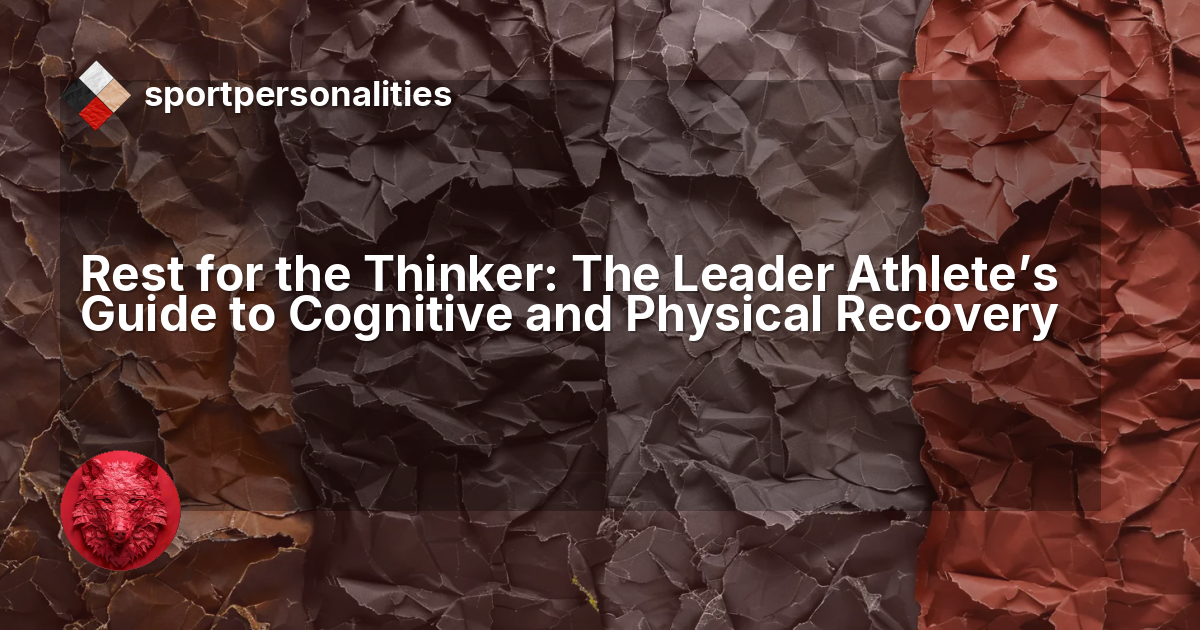The best strategists rarely announce themselves. They don't scream from the sidelines or pound their chests after a well-executed play. Instead, they operate in a quieter register, observing, analyzing, adjusting. For  The Leader (IOTC) sport profile, recovery isn't just physical restoration. It's the space where tomorrow's victories are mentally choreographed, where strategic insights crystallize, and where the collaborative passion that fuels them gets replenished.
The Leader (IOTC) sport profile, recovery isn't just physical restoration. It's the space where tomorrow's victories are mentally choreographed, where strategic insights crystallize, and where the collaborative passion that fuels them gets replenished.
But here's where Leaders run into trouble: their minds don't easily switch off. While other athletes collapse into Netflix binges or mindless scrolling during downtime, the IOTC personality keeps running tactical simulations. They replay yesterday's performance, dissect what went wrong, sketch out adjustments for next week. This relentless mental engagement feels productive, until it isn't.
The challenge for Leader athletes centers on a core tension. Their intrinsic motivation means they genuinely love the strategic puzzle-solving aspect of sport. Their tactical orientation keeps their analytical engine running constantly. Their collaborative nature makes them feel responsible for team outcomes even during rest periods. And their other-referenced  Competitive Style means they're tracking opponents, teammates, and tactical developments even when they should be unplugging.
Competitive Style means they're tracking opponents, teammates, and tactical developments even when they should be unplugging.
Real recovery for Leaders requires a protocol that honors their psychological wiring while protecting their mental reserves for when competition actually demands them.
The Mental Recovery Challenge for Strategic Athletes
Leaders face a recovery paradox that less cerebral athletes simply don't encounter. Physical rest comes relatively easily, take a day off from training, let the muscles repair, eat well, sleep adequately. But psychological recovery proves far more elusive when your brain treats strategic analysis like a favorite hobby.
The tactical mind never fully rests. Even during supposedly relaxing activities, Leaders find themselves pattern-matching. Watching a professional match becomes film study. A casual conversation with a training partner turns into competitive intelligence gathering. The mental chess match that makes them brilliant in competition becomes exhausting when it never stops running.
Research on cognitive recovery shows that strategic decision-making depletes specific mental resources that require genuine downtime to restore (reference suggested). When Leaders skip true psychological rest, they show up to important competitions with decision fatigue before the starting gun even fires. Their tactical brilliance becomes clouded. Their ability to read opponents in real-time diminishes. The very cognitive advantages that define their sport profile start working at reduced capacity.
The collaborative dimension adds another layer. Leaders feel responsible for team dynamics and collective preparation even during rest cycles. They check in with teammates, offer encouragement, analyze group training data. This emotional labor, while valuable, prevents the kind of psychological detachment necessary for complete recovery.
What True Mental Recovery Looks Like
Mental recovery for Leaders isn't about shutting down completely, that would feel unnatural and create its own form of stress. Instead, it requires strategic disengagement from the specific cognitive processes that competition demands.
True psychological restoration happens when three conditions align: the tactical mind shifts away from sport-specific analysis, the collaborative energy redirects toward non-performance relationships, and the intrinsic motivation finds expression through completely different domains.
This might mean engaging in strategic activities that have nothing to do with athletic performance. Leaders often recover well through activities like cooking elaborate meals (strategic but different), playing chess or strategy games (tactical thinking in a new context), or planning non-sport projects that satisfy their natural strategic orientation without depleting sport-specific mental resources.
The social dimension of recovery matters tremendously for collaborative athletes. Leaders restore energy through connection, but they need boundaries around sport-related interaction during recovery periods. Time with teammates is valuable, but it should center on non-performance topics. Shared meals, recreational activities, or simple social time without tactical debriefing allows the collaborative energy to replenish rather than drain.
The Cognitive Recovery Window
Timing matters more for Leaders than for other sport profiles. Their tactical minds operate on a rhythm that alternates between intensive analysis and necessary consolidation. Pushing through without honoring this rhythm leads to diminishing returns.
Elite Leader athletes develop acute awareness of when their strategic thinking remains sharp versus when it starts recycling the same patterns without generating new insights. That recycling phase signals the need for immediate psychological rest, not more analysis. Ignoring this signal leads to tactical tunnel vision, the very challenge that already poses a risk for this sport profile.
The recovery window typically requires 24-48 hours of genuine cognitive disengagement after intensive competition or high-stakes performance. During this period, Leaders need protection from their own tendency to dive back into strategic planning. They benefit from structured activities that occupy their attention without demanding sport-specific analysis.
Building Your Recovery Protocol
An effective recovery protocol for Leaders starts with honest assessment of which mental activities actually restore versus deplete. Many Leaders convince themselves that "light" tactical analysis during rest periods counts as recovery. It doesn't. Any activity that engages the same cognitive processes used in competition, opponent analysis, strategic planning, performance review, draws from the same mental reserves.
Identify Your Recovery Indicators
Learn to recognize when your strategic thinking starts losing effectiveness. Common signs include recycling the same tactical concerns without resolution, difficulty making clear decisions about minor issues, or reduced patience with tactical complexity. These indicators signal immediate need for psychological rest.
Create Strategic Boundaries
Designate specific recovery periods where sport-related tactical analysis is off-limits. This might mean 24 hours post-competition with zero film study, no opponent research, and no tactical discussions with coaches or teammates. Communicate these boundaries clearly so others can support them.
Redirect Your Natural Drives
Channel your intrinsic motivation toward completely different pursuits during recovery windows. Your collaborative energy can flow toward non-sport relationships. Your tactical mind can engage with strategy in different domains. Your competitive awareness can take a complete sabbatical without weakening when you return to sport.
The protocol must account for the Leader's intrinsic motivation, they need meaningful engagement even during rest. Complete disengagement from purposeful activity creates stress rather than alleviating it. The solution involves finding activities that feel inherently rewarding but operate in completely different domains from athletic performance.
Managing the Collaborative Pull
Leaders feel a constant gravitational pull toward team engagement. During recovery periods, this pull can prevent true psychological rest. The solution isn't isolation, that would contradict their collaborative nature, but rather redirecting social energy toward interactions that don't center on performance outcomes.
Recovery relationships should exist separately from performance relationships when possible. Time with family, non-athlete friends, or community connections that have nothing to do with sport allows the collaborative dimension to remain active without tapping performance-related emotional reserves.
When teammates or coaches approach with tactical discussions during designated recovery windows, Leaders need practiced responses that maintain boundaries without creating relationship friction. Simple phrases work: "I'm in recovery mode right now, can we discuss this tomorrow?" This protects mental reserves while honoring relationships.
The Sharp Mind When Stakes Rise
The entire purpose of psychological recovery becomes clear when competition arrives. A well-rested Leader brings tactical clarity that makes them nearly unstoppable. Their opponent analysis operates at full capacity. Their ability to adjust strategy mid-competition flows naturally. Their collaborative leadership emerges with confidence rather than forcing.
Leaders who neglect recovery show predictable patterns. They overthink routine situations that should be automatic. Their tactical adjustments come slower. They miss obvious strategic opportunities because their pattern-recognition systems are running on depleted resources. The collaborative leadership that normally comes naturally starts feeling forced or effortful.
The contrast between recovered and depleted Leaders is stark. At full capacity, they see the tactical landscape with remarkable clarity, multiple levels of strategy processing simultaneously, finding optimal solutions that others miss entirely. When running on empty, that same brilliant mind gets stuck in analysis loops, second-guessing decisions, or latching onto suboptimal strategies because the cognitive flexibility for finding better options has been exhausted.
Recovery as Strategic Advantage
The most sophisticated Leaders eventually recognize that recovery itself is a tactical decision, perhaps the most important one they make. When opponents are grinding through endless film study and marathon strategy sessions during rest periods, the well-recovered Leader shows up to competition with fresher cognitive resources and clearer tactical vision.
This creates a genuine competitive edge. While everyone else operates at 70-80% mental capacity due to insufficient psychological rest, the Leader who protects their recovery protocols operates closer to full capacity. That 20-30% difference in cognitive sharpness translates directly into better real-time decisions, clearer opponent reads, and more effective strategic adjustments.
The intrinsic motivation that defines Leaders helps here. They're not chasing external validation during recovery periods, which makes it easier to truly disengage from performance concerns. They can find genuine satisfaction in complete rest because their  Drive comes from internal sources rather than constant external feedback loops.
Drive comes from internal sources rather than constant external feedback loops.
Recovery becomes another expression of their strategic mastery, recognizing that peak performance requires deliberate cycles of engagement and restoration. The tactical mind that serves them so well in competition also serves them in building recovery protocols that honor their psychological needs while protecting their competitive resources.
Leaders who master recovery don't just perform well, they perform well consistently. Their strategic brilliance doesn't come and go based on how mentally exhausted they are. Their collaborative leadership doesn't depend on having enough emotional reserves left over after depleting themselves. They show up sharp when it actually counts because they've been strategic about when not to engage.
That's the recovery protocol that matches the Leader sport profile: strategic disengagement that protects cognitive resources, collaborative connection that doesn't center on performance, and intrinsic motivation redirected toward restoration rather than endless preparation. Simple in concept, but requiring genuine discipline to execute when every instinct pushes toward more analysis, more planning, more tactical refinement.
The athletes who get this right understand a fundamental truth: the strategic advantage isn't always about doing more. Sometimes it's about knowing when to step back so the mind that makes them exceptional can operate at full power when competition demands it.
This content is for educational purposes, drawing on sport psychology research and professional experience. I hold an M.A. in Social Psychology, an ISSA Elite Trainer and Nutrition certification, and completed professional training in Sport Psychology for Athlete Development through the Barcelona Innovation Hub. I am not a licensed clinical psychologist or medical doctor. Individual results may vary. For clinical or medical concerns, please consult a licensed healthcare professional.

